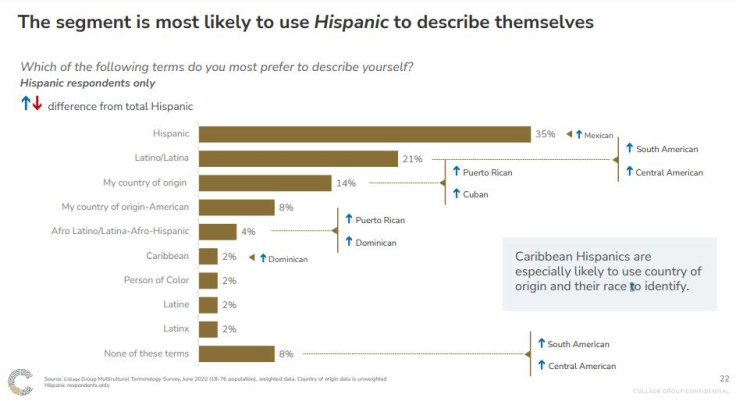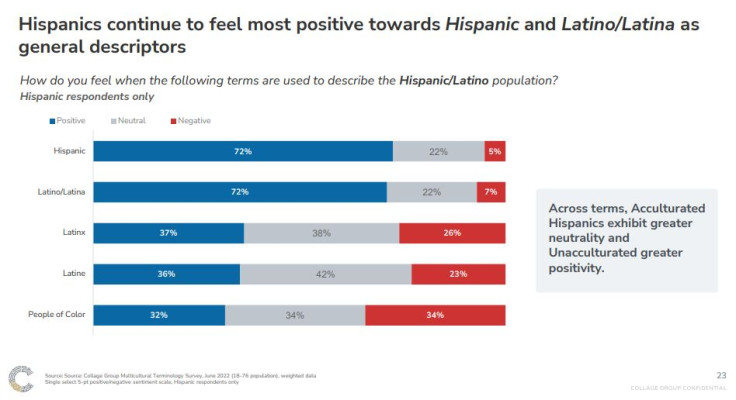
People with Latin American roots comprise one of the most culturally diverse demographic groups in the U.S. So, predictably, there isn't even much agreement on how to collectively name them. Which term best defines them?
Some people might answer 'Hispanics,' linking this population to the cultural heritage of Europe, especially the Spanish—the most spoken language in Latin America. But there's an issue in that definition: it drags Spain into the mix, and many might argue that the European country no longer has much to do culturally with the countries it once colonized.
Then there are those who prefer to be called 'Latinos.' They put their emphasis on the geography, the vast territory that inspired the Uruguayan legendary writer Eduardo Galeano to create one of the most impactful masterpieces of the last century, 'The Open Veins of Latin America.'
You might think that the discussion ends there, but it doesn't. Some people reject the idea of a regional identity altogether, choosing, for example, to identify as Mexicans or Mexican-Americans.
Then there's also the gender issue, with some advocating for the use of Latinx or Latine. Concepts of 'afro latinidad' or 'person of color' also come into play, blending questions of ethnicity with those of race.
It goes on and on. But which term do people prefer most? The 2024 Multicultural Demographics study by Collage Group provided insights into the major trends concerning how people with Latin American heritage feel about the various terms used to identify them.
Hispanic vs. Latino: Which Term is Preferred in this Demographic?

"Multiple terms are used for Americans from the Latin-American diaspora," though there is a clear winner in the Hispanic vs. Latino discussion, the study says.
According to the survey, conducted exclusively with people of Spanish-speaking Latin American origin for this portion, the preferred term was 'Hispanic.'
The interviewers asked: 'Which of the following terms do you most prefer to describe yourself?' About 35% of participants answered 'Hispanic,' while 21% said 'Latino/a.'
The study underscores that Mexicans tended to opt more for 'Hispanic' than the average, while South American and Central American respondents preferred 'Latino/a.'
The third place is held by those who prefer to be identified by their country of origin, making up 14% of respondents. The majority of individuals opting for this category were Cuban and Puerto Rican.
Approximately 8% of participants showed a preference for being called 'country of origin-American,' while 4% identified as 'Afro Latino/Latina' or 'Afro Hispanic,' particularly Puerto Ricans and Dominicans.
Another 2% associated themselves with 'Caribbeans,' with a specific emphasis on Dominicans, and 2% identified as 'people of color.'
Additionally, 2% chose 'Latine' and 2% preferred 'Latinx.' About 8%, with a higher proportion among South American and Central American respondents, selected 'None of these terms.'
Hispanic vs. Latino: Which Term is Preferred in this Demographic?

One key finding of the study pertained to the sentiments associated with those labels. The survey posed the question, "How do you feel when the following terms are used to describe the Hispanic/Latino population?" While the terms 'Hispanic' and 'Latino/a' elicited a positive interpretation from 72% of the respondents, other terms did not surpass 40%.
Latinx' was positively perceived by 37%, 'Latine' by 36%, and 'People of Color,' emphasizing experiences of being 'not white' and including individuals of Hispanic origin as well as those with roots or heritage from Asia and the Pacific Islands, received a 34% positive perception.
Interestingly, while Latinx and Latine received more neutral answers, at 38% and 42% respectively, 'People of Color' garnered only 34% neutrality. Additionally, a higher proportion of people—34%—expressed negative feelings about the term.
© 2025 Latin Times. All rights reserved. Do not reproduce without permission.





